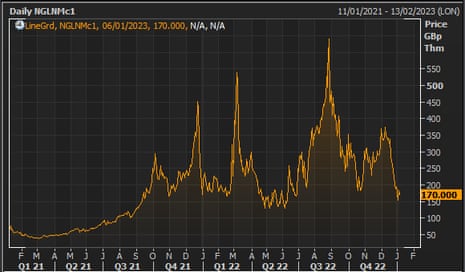Introduction: Treasury to announce reduced energy support scheme for businesses
Good morning, and welcome to our rolling coverage of business, the financial markets and the world economy.
New measures to help UK firms cope with soaring energy bills are expected to finally be announced today, but the support is likely to be less generous than the current package.
The new package is due to be announced to MPs today, ahead of the expiry of the present support package at the end of March.
Since the start of October, the unit cost of electricity and gas for non-domestic customers has been capped to help them through the winter – which is expected to have cost over £18bn by the end of March.
Chancellor Jeremy Hunt warned UK businesses last week that the current level of energy bill support for firms is “unsustainably expensive” – a hint that support will be cut from April.
The new scheme is expected to offer a discount to wholesale costs, rather than a fixed energy price, and heavy energy users could get a larger discount. It is expected to run for 12 months, until March 2024.
As Tony Jordan, a senior partner at consultancy Auxilione, explains:
“There is an acceptance that the structure of the commercial energy market is very, very complex.
Energy suppliers simply do not have the data on which industries their customers are in to tailor the support.”
A decision on how to extend the support for businesses had been due before Christmas, but was postponed until the new year, which left businesses facing “an anxious and uncertain” festive period.
The extent of Hunt’s reduction will also be crucial, as our energy correspondent Alex Lawson explained last weekend:
It has been reported that support could be cut by as much as half, potentially pushing up the “government-supported price” beyond £400 per MWh for electricity and £150 per MWh for gas, he says here.
The good news for businesses is that warmer-than-usual winter weather in northern Europe has helped to pull down wholesale energy costs in recent weeks.
The warmer-than-seasonal weather continues in North West Europe, crushing natural gas demand. For now, forecasts suggest more mild weather ahead.
I have updated the chart showing the mean temperature deviation vs the 30-year average up to Jan 5, including 10-day ahead forecast. pic.twitter.com/Fi9uLoogib
— Javier Blas (@JavierBlas) January 6, 2023
But wholesale gas prices are still over double their levels two years ago, despite dropping back from their highs after the Ukraine invasion last year.

Also coming up today
A leading thinktank has warned that British households are only halfway through a two-year cost of living crisis which will wipe over £2,000 off average incomes.
Typical disposable incomes for working-age family households are on track to fall by 3% in this financial year, and by 4% in the year to April 2024, according to the Resolution Foundation.
Resolution’s annual Living Standards Outlook for 2023 finds that only incomes of the very richest will rise, while middle-income households will struggle to make ends meet after an average £2,100 loss.
This income squeeze has fuelled industrial unrest across the UK in recent months, with strikes on the railways, in the civil service and within the NHS.
Ministers are set to hold a series of meetings with union leaders today. Rail minister Huw Merriman will hold talks with railway union bosses, who insist the Government is blocking a deal to end the long-running row over pay, jobs and conditions.
European stock markets are expected to open higher, as investors cling to hopes that the inflation squeeze may have peaked.
The agenda
Key events
UK manufacturers fear blackouts and job losses
Almost two-thirds of manufacturers in Britain fear blackouts this winter amid the fallout from the energy crisis, according to an industry survey.
Trade body MakeUK said the impact from sky-high energy costs on manufacturers showed no sign of abating, as concern grows about government plans to cut financial support for businesses.
According to a survey of more than 200 senior manufacturing industry bosses by MakeUK and the accountancy firm PwC, almost three-quarters of companies (70%) expect their energy costs to increase this year, with two-thirds saying they expect to cut production or jobs as a result.
The industry group, which represents 20,000 UK manufacturers, said that cutting financial support would exacerbate job losses and reduce factory output, hurting the economy.
More here:
Natasha Clark of The Sun has more details of today’s upcoming announcement on energy support for businesss:
New – Jeremy Hunt to reveal another £5bn of energy help for businesses for another year. Will today set out new system for after April.
But will be sharp drop in support, and not tapered down. Some will see cash drop to 60pc of current level. More for energy intensive industry
— Natasha Clark (@NatashaC) January 9, 2023
Firms will receive a discount on each unit of gas and electricity – rather than the current system which sees a set price per unit
Helped by wholesale prices falling
Gov insiders privately feel it won’t be enough and Hunt could have to offer more in future
— Natasha Clark (@NatashaC) January 9, 2023
And long term post 2024 system all yet to be decided depending on how prices go
— Natasha Clark (@NatashaC) January 9, 2023
Introduction: Treasury to announce reduced energy support scheme for businesses
Good morning, and welcome to our rolling coverage of business, the financial markets and the world economy.
New measures to help UK firms cope with soaring energy bills are expected to finally be announced today, but the support is likely to be less generous than the current package.
The new package is due to be announced to MPs today, ahead of the expiry of the present support package at the end of March.
Since the start of October, the unit cost of electricity and gas for non-domestic customers has been capped to help them through the winter – which is expected to have cost over £18bn by the end of March.
Chancellor Jeremy Hunt warned UK businesses last week that the current level of energy bill support for firms is “unsustainably expensive” – a hint that support will be cut from April.
The new scheme is expected to offer a discount to wholesale costs, rather than a fixed energy price, and heavy energy users could get a larger discount. It is expected to run for 12 months, until March 2024.
As Tony Jordan, a senior partner at consultancy Auxilione, explains:
“There is an acceptance that the structure of the commercial energy market is very, very complex.
Energy suppliers simply do not have the data on which industries their customers are in to tailor the support.”
A decision on how to extend the support for businesses had been due before Christmas, but was postponed until the new year, which left businesses facing “an anxious and uncertain” festive period.
The extent of Hunt’s reduction will also be crucial, as our energy correspondent Alex Lawson explained last weekend:
It has been reported that support could be cut by as much as half, potentially pushing up the “government-supported price” beyond £400 per MWh for electricity and £150 per MWh for gas, he says here.
The good news for businesses is that warmer-than-usual winter weather in northern Europe has helped to pull down wholesale energy costs in recent weeks.
The warmer-than-seasonal weather continues in North West Europe, crushing natural gas demand. For now, forecasts suggest more mild weather ahead.
I have updated the chart showing the mean temperature deviation vs the 30-year average up to Jan 5, including 10-day ahead forecast. pic.twitter.com/Fi9uLoogib
— Javier Blas (@JavierBlas) January 6, 2023
But wholesale gas prices are still over double their levels two years ago, despite dropping back from their highs after the Ukraine invasion last year.

Also coming up today
A leading thinktank has warned that British households are only halfway through a two-year cost of living crisis which will wipe over £2,000 off average incomes.
Typical disposable incomes for working-age family households are on track to fall by 3% in this financial year, and by 4% in the year to April 2024, according to the Resolution Foundation.
Resolution’s annual Living Standards Outlook for 2023 finds that only incomes of the very richest will rise, while middle-income households will struggle to make ends meet after an average £2,100 loss.
This income squeeze has fuelled industrial unrest across the UK in recent months, with strikes on the railways, in the civil service and within the NHS.
Ministers are set to hold a series of meetings with union leaders today. Rail minister Huw Merriman will hold talks with railway union bosses, who insist the Government is blocking a deal to end the long-running row over pay, jobs and conditions.
European stock markets are expected to open higher, as investors cling to hopes that the inflation squeeze may have peaked.











